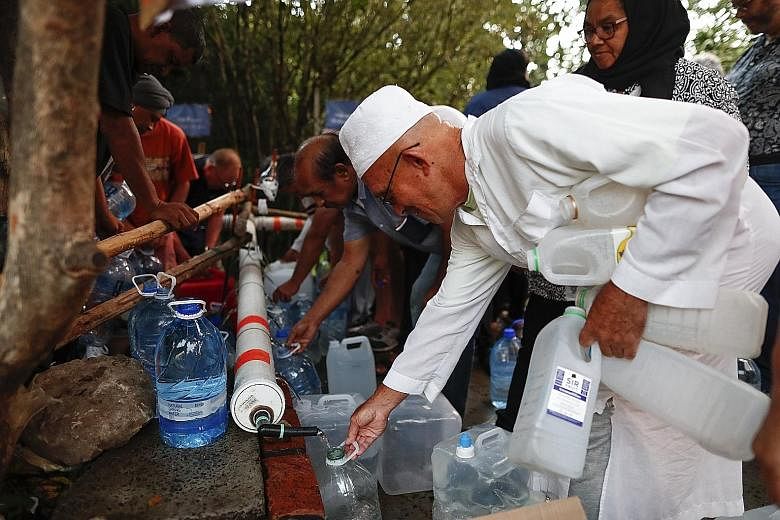In picture-perfect but parched Cape Town, each resident can use only 50 litres of water a day.
This is enough for a two-minute shower, eight glasses of drinking water, washing dishes and cooking - the last two tasks not more than twice a day. All these will use up about 30 litres of water. The rest would go towards general hygiene and a single toilet flush.
"We have a new saying in town: If it's yellow, let it mellow," said technician Sipiwe Mavundla, referring to the toilet.
Cape Town - South Africa's tourist hub - is in the throes of its worst drought in centuries, after three years of low rainfall.
Global warming and a rapidly growing population have worsened its water crisis.
The tourism industry is urging visitors to stick to the 50 litres per person per day restriction, according to a hotel in Muizenberg on the south coast. For its part, the hotel also recycles laundry water for purposes such as watering lawns.
Some restaurants in the city now use tumblers instead of glasses.
-
50 litres
How much water each Cape Town resident can use a day - enough for a two-minute shower, general hygiene, a single toilet flush, eight glasses of drinking water, washing dishes and cooking, the last two tasks not more than twice a day.
While noting that there have been no statistics yet that suggest a fall in tourist traffic to the city, Mr Enver Duminy, chief experience officer of Cape Town Tourism, told the media last week that he felt the ripple effects of the drought on the industry.
Cape Town is set for "Day Zero" in mid-April, when taps in the city of four million people will be turned off. Residents will have to queue for their daily rations at about 200 water stations in the city.
Mayor Patricia De Lille has warned that the day could arrive even sooner unless residents keep their water usage minimal.
Bank employee Jaye Panther said: "This crisis is affecting us big time. It's hard to cope.
"I can taste something like metal in tap water," she added, lamenting soaring prices for bottled water.
While some of her neighbours are stockpiling water, she and her husband are now considering relocation as they suspect the drought could be long term.
Households and businesses are taking measures to save water.
"I have to repeat clothes before washing them," said Ms Panther.
She pointed out that companies are asking their employees to bring drinking water from home.
"We can manage that, but it's hard for large families because bottled water is expensive. These guys (retailers) have inflated prices. Our office block has shut the air-con."
Gym chain Virgin Active has done away with saunas and replaced showers with a bucket system. However, some gym goers use far more than their allocated bucket of water, said Mr Mavundla.
Some of his township-based colleagues take 20-litre containers from home to replenish at re-filling spots for a small charge, or for free at rivers and springs. Sometimes, the military is brought in to maintain order.
The water crisis has dealt a major blow to small businesses, notably hair salons, launderettes and car washes, according to resident David Ndyalvan.
Their profits are closely linked to the amount of water available for their services, he said. Customer satisfaction also hinges on cleanliness, which in turn is also dependent on water.
The acute shortage of water has also hit sporting activities. The provincial cricket association surprised many when it terminated all club and school cricket. Schools are also discouraging children from playing too much in case they dehydrate.
"We have already seen the quality of our cricket drop over the course of the season due to the poor state of our fields and pitches," the association's Mr Clinton du Preez told the Cape Argus newspaper.
Residents also worry about the health ramifications, with threats of airborne diseases lingering especially in the crowded Cape Flats neighbourhoods and slum areas.
Runaway fires, synonymous with the Cape Flats slums, also threaten the city amid the water crisis.

